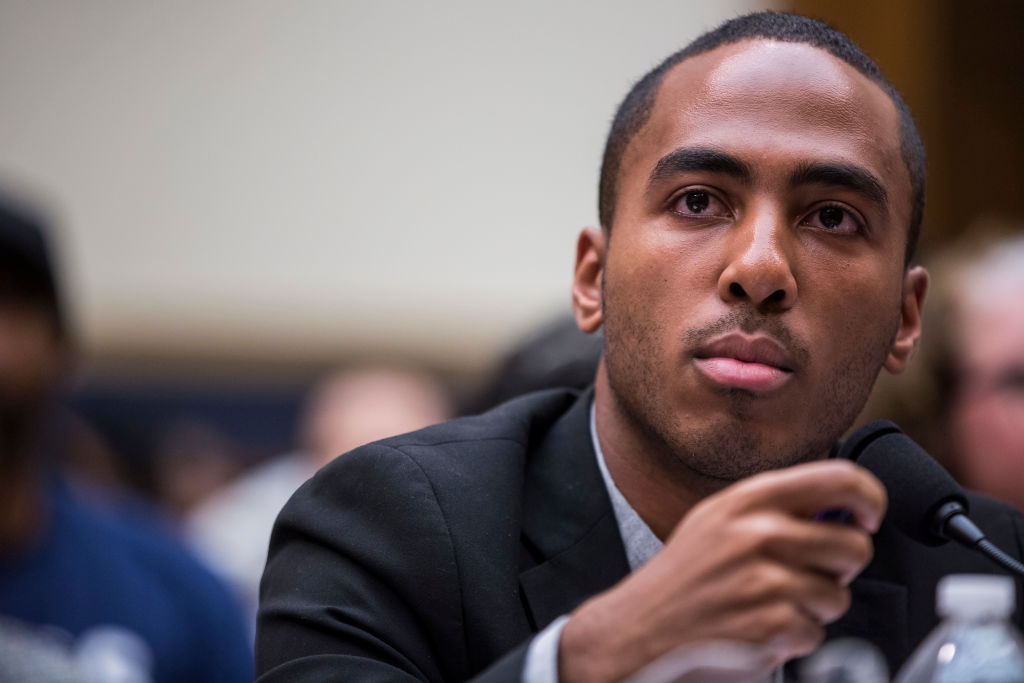Claudine Gay would have you believe that her resignation as president of Harvard University was because of her identity. The scandal, in her and her allies’ eyes, was that — as she wrote in a New York Times op-ed — she was “a Black woman selected to lead a storied institution.” Never mind that her allies wouldn’t say the same if black academics they don’t like, like Thomas Sowell or John McWhorter, were involved in a similar scandal; their lens is always a racial one.
But the colorblind response would throw all this aside. Colorblindness — as Coleman Hughes writes in his new book, The End of Race Politics — is simply the idea that identity and ethnicity, as assessed by the color of someone’s skin, should not be used to judge either an individual’s actions or how he should be treated. Hughes defines colorblindness as “consciously disregarding race as a reason to treat individuals differently and as a category on which to base public policy.” It is the belief that merit is appropriately used to determine many norms in society and that race is irrelevant in assessing fairness.
In this view, Claudine Gay wasn’t forced to resign because she was a black woman, but because she was a serial plagiarist. Hughes argues that even some of the most racially sensitive episodes of the past few years are better understood outside of the context of race, such as the death of George Floyd. It was a heinous example of police violence, but not uniquely so. The fatal choking of Tony Timpa, a white man in a mental health crisis, in 2016 was just as awful, but received almost no public or media attention.
Hughes has become one of the youngest and most vocal advocates for colorblindness and has sparked sharp controversy because of it. His 2023 TED Talk on the topic was suppressed by the organization after TED’s staff was outraged by his arguments, and afterwards he defended himself by debating New York Times columnist Jamelle Bouie, who has repeatedly called Hughes part of a “cotton industry” of non-white commentators who deny that America is structurally racist.
;768:[300×250,336×280,320×100];0:[300×250,320×100,320×50]”]The End of Race Politics expands on the arguments Hughes has made for several years, providing a detailed look at the history and implications of colorblindness. However, it’s questionable how effective this will be at persuading those who don’t already agree with his worldview.
Hughes begins the book, “I always find race boring.” In his view, colorblindness should be the default liberal value, and we shouldn’t care much for the concept of “race,” particularly given how amorphous it is in contemporary, mixed-race societies. He argues that the chief use of “race” seems to be by loud leftist advocates — whom he labels “neoracists” — trying to claim victimhood and unearned higher status in our elite institutions. It was seeing this at his alma mater Columbia University that he “became convinced that the new race obsession that brands itself ‘anti-racist’ is the opposite.”
The book’s most important chapter addresses the history of “colorblindness”; he argues that the idea was pushed by radical activists during the nineteenth and twentieth centuries rather than being a recent phenomenon pushed by conservatives. He describes the work of Wendell Phillips — an abolitionist who served as a member of the American Anti-Slavery Alliance and who believed that governments should be colorblind, citing a speech where he proposed that race should be eliminated from American politics. The End of Race Politics also attempts to push back against the historical revisionism of opponents of the idea that race was core to Brown v. Board of Education, or that the Civil Rights movement was driven by a racial viewpoint, when its aims were to create a colorblind legal system.
The history is rich and interesting, but Hughes is less persuasive in his proposed remedies to racism, which strike even the sympathetic reader as quite tame. One of Hughes’s requests is to remove racial slurs from our vocabulary, which would seem impossible in a world where vulgar humor, regardless of race, is so rewarded and enjoyed. He can also be vague in his solutions, like suggesting institutions make their processes as blind as possible without providing an example of what had actually worked to support his claims. It’s convincing to those who agree with Hughes already, but if you think racial diversity is an inherently valuable end, worth pushing for through hiring systems, The End of Race Politics is unlikely to change your mind.
Though Hughes makes similar arguments to other colorblind writers like Thomas Sowell and Thomas Chatterton Williams, he remains an original voice, with a crisp prose that’s quite gentle and tough whenever it wants to be, and a distinct optimism about America’s future, as it moves away from polarization. The End of Race Politics isn’t going to persuade Ibram X. Kendi or his readers, and doesn’t call for an immediate ceasefire to racial politics, let alone propose policies that could achieve that. But simply having the history of colorblindness out there, from a reasonable, eloquent writer, pushes us slightly closer to that better, post-race tomorrow.
;768:[300×250,336×280,320×100];0:[300×250,320×100,320×50]”]This article was originally published in The Spectator’s March 2024 World edition.


























Leave a Reply